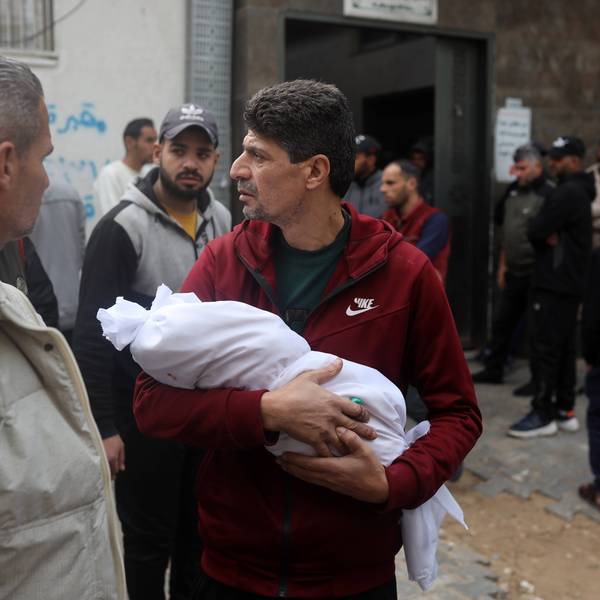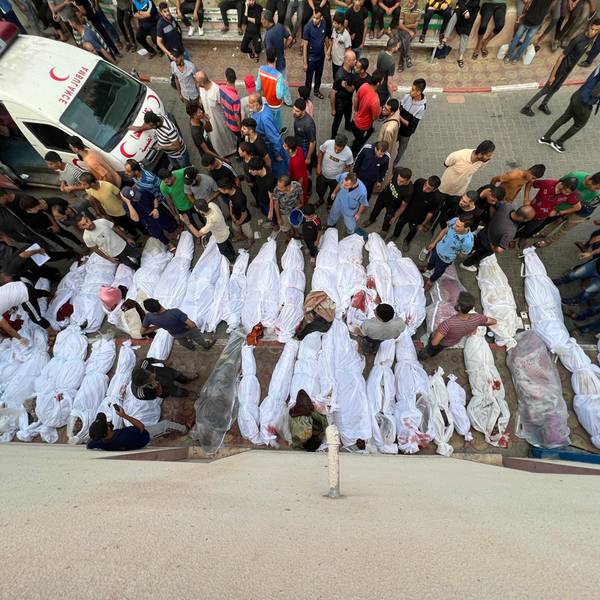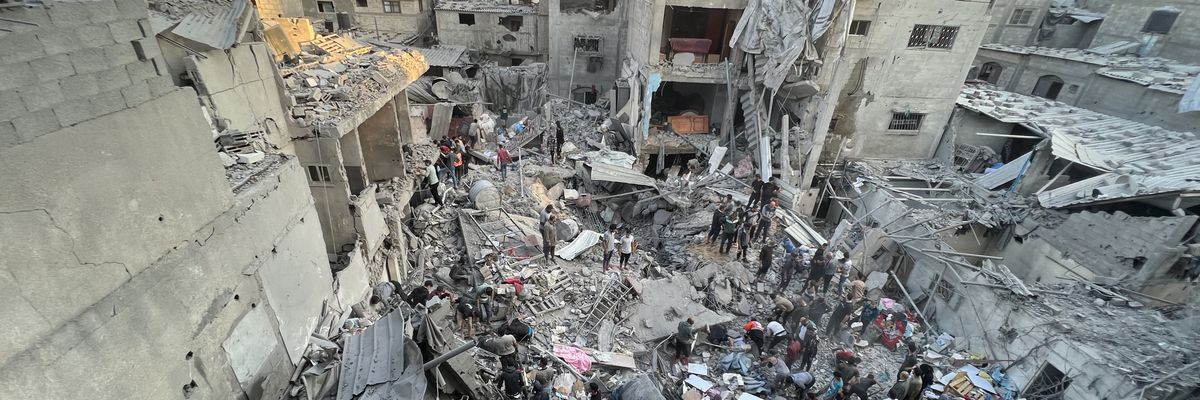Israeli airstrikes on Gaza reportedly killed more than 100 Palestinians on Saturday—including upwards of 80 people in the hard-hit Jabalia refugee camp—bringing the Palestinian death toll in the 44-day war to over 13,000 as the Biden administration refuted reports of a breakthrough in cease-fire negotiations between Israel and Hamas.
The Gaza Health Ministry said Saturday that a pair of Israeli airstrikes on the densely populated Jabalia camp—including on a United Nations school where thousands of people were sheltering from relentless bombardment—killed more than 80 people. Among the dead are reportedly 32 members of the Abu Habal family, including 19 children.
"Shelters are a place for safety. Schools are a place for learning. Tragic news of the children, women, and men killed while sheltering at al-Fakhouri school in northern Gaza," United Nations Under-Secretary-General for Humanitarian Affairs and Emergency Relief Coordinator Martin Griffiths said on social media. "Civilians cannot and should not have to bear this any longer."
Philippe Lazzarini, director of the U.N. Relief and Works Agency for Palestine Refugees in the Near East, lamented the "horrifying images" he saw of the bombing, while stressing that "a humanitarian cease-fire cannot wait any longer."
Previous Israeli attacks on Jabalia—including one last week that killed at least 126 Palestinians—more than half of them children—have been condemned by international experts as war crimes.
Meanwhile, Palestinian officials said Israeli bombardment of an apartment building in Khan Younis in southern Gaza—where Israeli authorities had directed Palestinians to flee for their lives—killed 26 people and injured 23 more. Six Palestinians were also reportedly killed in an Israeli attack on a house in Deir Al-Balah.
Gaza officials said that more than 13,000 Palestinians—including over 5,500 children and 3,500 women—have been killed during Israel's retaliatory war on the embattled enclave since the October 7 Hamas-led attacks that left around 1,200 Israeli and others dead and approximately 240 people taken hostage.
Tens of thousands of Palestinians have been injured, while as many as 1.7 million people—or about 70% of Gaza's population—have been forcibly displaced in a war that numerous experts have called "genocidal."
In the United States, the White House on Saturday refuted reports of an imminent Qatari-brokered temporary cease-fire between Israel and Hamas.
"No deal yet but we continue to work hard to get a deal," White House National Security Council Spokesperson Adrienne Watson said in a statement.
Israeli Prime Minister Benjamin Netanyahu said Saturday night that an extremely limited amount of fuel would be allowed into Gaza for the purpose of averting the spread of communicable diseases.
"This is not a change of policy but a limited, localized response in order to prevent the outbreak of epidemics," he explained.
Netanyahu also vehemently rejected international calls for a cease-fire, vowing that "we will continue to fight until victory."
Former Human Rights Watch executive director Kenneth Roth said on social media that Saturday's strikes show "there is nowhere safe for Gaza's civilians."
"First the Israeli military told Palestinian civilians in northern Gaza to move south to avoid being bombed. Now, as Israel bombs in the south, it tells them to move west," Roth noted. "But Hamas is throughout Gaza."
"What's next? Expulsion to Egypt and Nakba II?" he added, referring to a modern-day version of the ethnic cleansing campaign that forcibly expelled more than 750,000 Arabs from Palestine during the establishment of the modern state of Israel 75 years ago.




